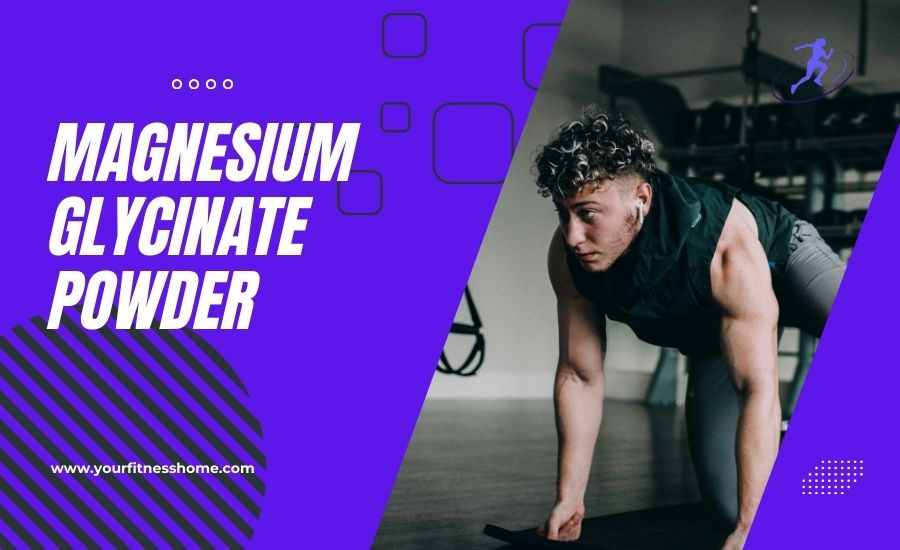Magnesium glycinate is one of the least likely forms to cause loose stools, and it’s generally pretty safe in supplemental form. Still, at Your Fitness Home, you will be aware there may be some risks associated with high-dose use or in certain individuals.
Digestive issues: You may notice mild digestive issues with magnesium glycinate, including things like stomach upset and diarrhea. The use of this supplement can reduce these effects to some extent if taken with a meal.
Toxicity of Magnesium: Very rare, but there can be an overconsumption of magnesium. It is more common in people with kidney disease, or those taking large amounts. The symptoms of magnesium toxicity are nausea, vomiting, muscle weakness, or cramps, and in severe cases can cause an irregular heartbeat which may even lead to cardiac arrest.
Important Considerations:Please consult with your doctor before taking magnesium glycinate if you have conditions like kidney disease and hate problems.
Can interact with Medications: Magnesium may interfere with certain medications, such as antibiotics and blood pressure drugs. Always inform your doctor about any medications you are taking before beginning to use magnesium glycinate.
You should adhere to the recommended dosage of any Supplements on your pack or as suggested by a pharmaceutic Consuming too much magnesium can put you at risk for side effects.

5 Alternatives To Powder Magnesium Glycinate
Although magnesium glycinate powder is a popular pick, it may not necessarily be the right fit for each person. Read on for more of the best alternative forms of magnesium supplements you can buy.
1. Magnesium Citrate:
Pro: Easily absorbed by the body Might act as a mild laxative to relieve constipation
Downside: Less well tolerated in larger doses than glycinate.
2. Magnesium Malate:
Pros: Energy Production (May be useful for chronic fatigue/fibromyalgia).
Disadvantages: Slideshows are less likely to be shared”.
3. Magnesium Taurate:
Benefits: Can be beneficial for cardiovascular health, and blood pressure.
Negatives: Not as popular so can be more costly than other alternatives.
4. Magnesium Threonate:
Pros: Some preliminary research shows it can help cognition and memory.
Limitations: Studies are few and need further work to be conducted. Other forms could be more expensive
5. Liquid Magnesium
Pros: Easy to quantify and ingest Ideal for people that hate caps or powder
Cons: May include added sugars or tastes. Check the label carefully.
Is It Safe To Use Magnesium Glycinate Powder For Women?
Magnesium glycinate in and of itself is safe for women when used as directed. Nevertheless, women with certain underlying medical conditions for instance kidney disease may need to consult a physician before use. While consuming a powerful dosage, do not expect your stomach to be happy about it. In general, the safety of magnesium glycinate is about equivocal in females as it is in males. (New blog: Best Female Pre Workout)
How does Magnesium Powder Glycinate help in Muscle Growth?
Although the mineral is important in muscle performance and recovery, it is not one of the spark plugs that ignite muscle growth. It is responsible for functions such as energy production and protein synthesis, which can indirectly support muscle health. Magnesium glycinate can thus contribute to muscle growth, but you would also need a proper diet and workout regime. For a deeper understanding of magnesium’s benefits, safe dosage, and potential risks, you may refer to the Magnesium Fact Sheet by the National Institutes of Health (NIH).
How To Avoid Side Effects Of Magnesium Glycinate Powder?
While magnesium glycinate is touted for being gentler on the stomach, some users may still experience side effects, such as diarrhea. (you may like: Meal Replacement Protein Powder) Some simple ways to reduce rug wrinkles:
- Low and Slow: Start at approximately 100mg, slowly working your way up over a week to allow for the body to get used.
- Your Butt Must Have a Death Wish: Sulforaphanes are not specifically absorbed just because you eat them with food homo sapiens must be the only animals trying this crap.
- Stay Hydrated: Drink plenty of water all day – you should always do this, but especially so when taking magnesium and for optimum breast health…not just because it can avoid constipation.
- Pay Attention to Your Body: If you have serious side effects, then discontinue the supplement immediately and get in touch with your physician or GP They will be able to recommend whether you need more or less, provide advice on altering the dose of magnesium that you are taking and/ or suggest an alternative ionomer.
| You may also like to read: Myovite Multivitamin Benefits and usage |
Disclaimer
The information provided in this article is for educational and informational purposes only and does not constitute medical advice. Always consult with a qualified healthcare professional before using magnesium glycinate powder or any other supplement. Individual needs and health conditions vary, and self-diagnosis or treatment may lead to harmful outcomes. The author and publisher are not responsible for any adverse effects resulting from the use of the information presented here.
FAQs
What are the common side effects of magnesium glycinate powder?
Some people may experience diarrhea, stomach cramps, or nausea when taking magnesium glycinate powder. These side effects usually occur at higher doses. Most users tolerate it well when taken as directed.
Why can magnesium glycinate powder be dangerous in high doses?
Excessive intake can lead to magnesium toxicity, causing symptoms like low blood pressure, irregular heartbeat, or difficulty breathing. In severe cases, it may lead to coma or death. Always follow the recommended dosage to avoid overdose.
Who should avoid taking magnesium glycinate powder?
People with kidney disease, heart block, or those on magnesium-containing medications should avoid it. Magnesium builds up in the body when kidneys don’t function properly. Always consult a doctor before use.
When is the best time to take magnesium glycinate powder safely?
It’s usually best taken with food, either in the evening or before bedtime. This helps reduce the risk of stomach upset and supports better sleep. However, timing can vary based on your health needs.
Where can side effects from magnesium glycinate powder appear first?
Side effects often start in the digestive system, such as bloating, gas, or loose stools. In rare cases, muscle weakness or drowsiness may follow. Monitor your body’s response closely after use.
How does magnesium glycinate powder interact with other medications?
It can interfere with certain antibiotics, blood pressure drugs, and diuretics. These interactions may reduce the effectiveness of medications or increase magnesium levels dangerously. Always tell your doctor about all supplements you’re taking.
What is the recommended dosage of the magnesium glycinate powder?
Most adults are advised to take 200–400 mg of elemental magnesium daily, depending on their needs. Always check the supplement label for specific dosage instructions. Do not exceed the upper limit unless directed by a healthcare provider.
When should you not use the magnesium glycinate powder?
Avoid it if you have kidney issues, are already taking magnesium-containing drugs, or have been told to limit magnesium. Using it without medical guidance can be risky. It’s also not recommended before surgery without doctor approval.
Can diabetics use the magnesium glycinate powder?
Yes, but only under medical supervision. Magnesium may help improve insulin sensitivity, but excessive intake can affect blood sugar control. Always monitor blood glucose levels while using supplements.
Can pregnant women use the magnesium glycinate powder?
Magnesium is essential during pregnancy but should only be used as recommended by a doctor. High doses can lead to complications for both mother and baby. Always consult your OB-GYN before taking any supplement.


